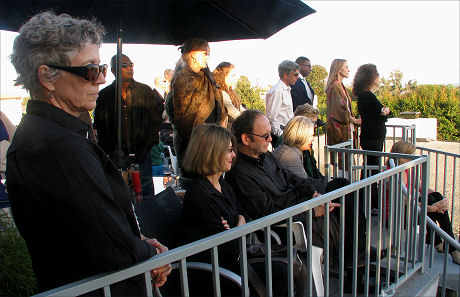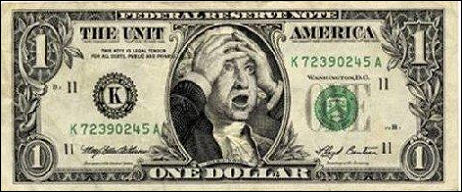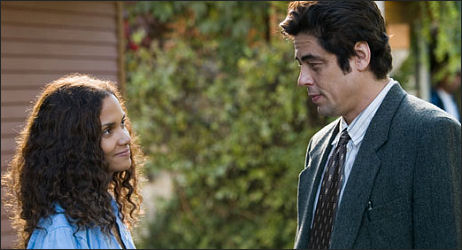
Contributors at today’s Barack Obama fund raiser at home of Cedering Fox in Santa Monica — 10.6.08, 6:25 pm



In a 10.3 N.Y. Times piece wondering about the commercial potential of Ridley Scott‘s Body of Lies (Warner Bros., 10.10), John Anderson writes, “To paraphrase the old Vietnam-era bumper sticker: What if they gave a war movie and nobody came?” I sense interest in Scott’s war thriller, but not excitement. The real voltage will happen, I predict, with the arrival of Kathryn Bigelow‘s The Hurt Locker. Which Summit Entertainment is afraid to release this year. (Or was the last time I looked.)
A 10.5 AP report states that Sarah Palin‘s claim that Barack Obama is “palling around with terrorists” is “unsubstantiated” and carries “a racially tinged subtext that John McCain himself may come to regret.” That ain’t the half of it. If McCain wants to play the guilt-by-association game…
I happened to turn on Susanne Bier‘s Things We Lost in the Fire on HBO a little while ago, and it got me once again. I’m now more certain than ever that the critics and audiences who turned away from this faintly flawed but deeply moving film really missed the boat. Maybe this’ll hit some of them down the road and they’ll ask themselves, “What was I thinking?”

I really like this section from my 10.5.07 review:
“There can be no beating around the bush about Benicio Del Toro‘s performance as Jerry the junkie, a once-successful lawyer who’s slid down into the pit. Over the course of this two-hour film he climbs out of his drug hole, brightens up, chills out and settles in, relapses, almost dies, and then gradually climbs out of it again.
“I’m starting to see this actor (whom his friends and Esquire magazine profilers call ‘Benny’) as almost God-like in the Brando sense of that term. He’s holding bigger mountains in the palm of his hand, right now, than De Niro held in the ’70s and ’80s. He’s one of the top four or five superman actors we have out there. There isn’t a frame of his performance that doesn’t hit some kind of behavioral bulls-eye.
“I’ll tell you this — when journalists who’ve seen Things We Lost in the Fire go ‘I don’t know…meh’ and then say in the same breath that some other so-so film is ‘pretty good’ there’s some kind of virus out there that I don’t want to give a name to.”
The Globe cafe and bookstore in Prague (south of Narodni, on Pstrossova 6) will be showing the second Obama-McCain debate on Wednesday morning, 10.8, at 3 am, with a re-broadcast at 11 am later that morning.

Nikki Finke reported about two hours ago that original DreamWorks partner David Geffen is moving on after 14 years. She got this from an early look at a press release “to be issued about the formal separation of DreamWorks and Paramount,” blah blah. It also says that “a decision on who will be the new distributor for DreamWorks 2.0 will be made at the beginning of the week by Steven Spielberg. No suspense about this as everybody’s figuring Universal.
Why don’t I care more about this? Because I’ve always chosen to regard the comings and goings of powerful rich guys as a corporate parlor drama that doesn’t really affect my realm. Many journalists feel differently. They get wet over this stuff. You have to be up on who’s running what, of course, but that’s as far as it goes with me.
Sometimes car accidents can be…well, not too bad. Sometimes they can be shrugged off with no cops, no insurance, no injuries, no nothin’. I learned this around 5:30 in the morning on the Hutchinson River Parkway when I was 18 or 19, and I’ve never forgotten the lesson. Not everything that goes badly needs to be catastrophic.
Three of us had done an all-nighter in Manhattan, wandering around the streets on mescaline, the usual West Village-East Village walk-around, not much cash, soaking up the energy. We drove back to Connecticut around 5 am, the light starting to break. And somewhere around Rye, or right before the Connecticut border, we came around a curve and there was this beige Volkswagen Beetle lying on its side, the owner standing nearby, looking more or less unruffled and going “hmmm.”
We immediately pulled over, put on the flashers, got out and ran over and helped the guy right it. One, two, three…done. Quick thanks, hand shake, the bug (which had no serious marks or dents) started right up and he took off. Then we did the same. It was semi-dangerous standing around near a curve, of course. The whole deal took maybe 90 seconds…okay, two minutes. My friends and I hardly spoke of it later, that morning or during the weeks and months that followed.
A 10.5 Columbus Dispatch poll of 2262 likely Ohio voters favors Obama over McCain by 49-42. The poll covers 9.24 to 10.2, doesn’t reflect the Biden-Palin debate effect, and has a two-point margin of error. And the N.Y. Times is calling Ohio a toss-up state? I’d at least call it a “leaning Obama” light blue state…no?
“Falling far behind in Ohio is a nightmare scenario for McCain,” the New Republic‘s Michael Crowley wrote today. “He almost surely can’t win without it. And remember, absentee early voting has already started there. Obama’s support among African-Americans in Ohio: 94-2.
“Update: I had thought this was Obama’s best showing in Ohio, but I forgot that (a) Quinnipiac showed him +8 here last week and (b) the Real Clear Politics spread is Obama +3.”
“It is intellectually slovenly to demean religion based on what goes wrong in secular society,” writes N.Y. Press critic Armond White. “Bill Maher‘s one-sided view never looks deep enough to respect other people’s views. Robert Bresson‘s Diary of a Country Priest hit greatness in its mysteriously ambivalent repentance scene. And Christopher Durang‘s classic play, Sister Mary Ignatius Explains It All For You, conveyed the anguish of a lifetime spent in moral contemplation.
“Neither art nor philosophy, Religulous highlights Maher’s sourpuss for nearly two hours of flimsy barroom rhetoric. ‘Religion must die for man to live,’ he summarizes. Maher became a theology expert around the time Jon Stewart became a political analyst; it’s a hoodwink akin to the moment the Reagan administration registered ketchup as a vegetable in public school cafeterias.”
There’s nothing slovenly about applying rational thought to absurd religious mythology, which is all that Maher’s doing. What is missing in Religulous, I feel, is an acknowledgement by Maher that most of the great thinkers of the last 1000 years have gone into the mystic, sensing in one way or another a certain cosmic order or universal design. Albert Einstein spoke of this, and he wasn’t exactly given to Christian superstition. You can’t just say that widely shared notions of some kind of celestial harmony within and without are nothing. You can’t just wave them off.
“The [Vice-Presidential] debate’s most telling passage arrived when Joe Biden welled up in recounting his days as a single father after his first wife and one of his children were killed in a car crash. Sarah Palin‘s perky response — she immediately started selling McCain as a ‘consummate maverick’ again — was as emotionally disconnected as Michael Dukakis‘s notoriously cerebral answer to the hypothetical 1988 debate question about his wife being ‘raped and murdered.’ If, as some feel, Obama is cool, Palin is ice cold. She didn’t even acknowledge Biden’s devastating personal history.” — from Frank Rich‘s 10.5 N.Y. Times column, titled “Pitbull Palin Mauls McCain.”